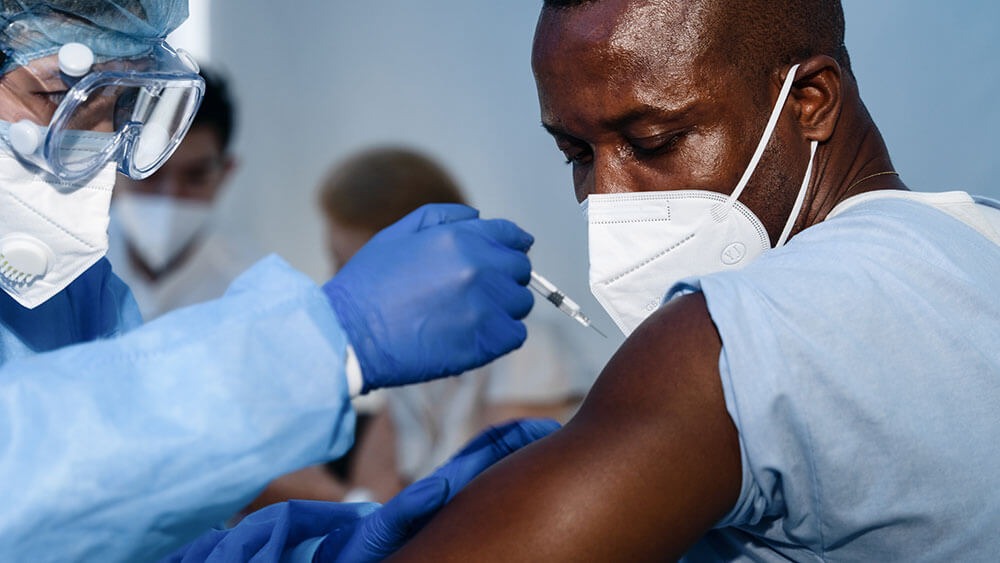
A patient receives a COVID-19 vaccination. The Equal Employment Opportunity Commission said employers can require workers be vaccinated, but with caveats.
Employers can require their employees to get a COVID-19 vaccine and prevent them from entering the workplace if they refuse, the federal government has said, but employers need to be careful about how they handle the process.
The U.S. Equal Employment Opportunity Commission (EEOC), the agency that enforces laws against workplace discrimination, offered the guidance because the Americans With Disabilities Act of 1990 puts limits on employers making it mandatory that employees receive medical examinations that ultimately reveal private information about an employee’s physical or mental conditions.
But in a Dec. 16 update to its “What You Should Know About COVID-19 and the ADA, the Rehabilitation Act, and Other EEO Laws” guidelines, the commission explained a COVID-19 vaccination requirement does not bring up these ADA issues.
“If a vaccine is administered to an employee by an employer for protection against contracting COVID-19, the employer is not seeking information about an individual’s impairments or current health status,” the commission said, “and, therefore, it is not a medical examination.”
RELATED: Companies Impose Employee Vaccine Mandates as Delta Variant Spreads
The commission added that requiring an employee to show proof of vaccination is not a disability-related inquiry. “There are many reasons that may explain why an employee has not been vaccinated, which may or may not be disability-related,” the commission said.
Section K.3 of the guidance, however, goes on to state that further questions from the employer, such as asking why the employee did not receive a vaccination or other prescreening questions, “may elicit information about a disability and would be subject to the pertinent ADA standard that they be ‘job-related and consistent with business necessity.’”
Reasonable Accommodations
There are options for employees who can’t get a vaccine due to a disability or who do not wish to get a vaccine. Workers can seek a vaccine exemption on medical grounds or due to religious beliefs, said Dorit Reiss, a law professor at the University of California, Hastings, who specializes in legal and policy issues related to vaccines.
Reiss said that if employees have medical reasons or sincerely held religious beliefs that prevent them from receiving a vaccine, employers may be required to give the workers a reasonable alternative to continue to work. Also, the EEOC guidance said that even if an employer finds that a worker who cannot be vaccinated poses a risk to the workplace, the employer cannot prevent the employee from working or fire them unless the employer cannot provide a reasonable accommodation that would reduce this risk to others.
“That might be a [wearing a] mask, a working from home, or a working separately from other people alternative. As long as it’s not too significant a barrier for the employer,” Reiss told the AARP Bulletin. “If you can achieve the same level of safety as the vaccine via mask, or remote working, you can’t fire the employee. You need to give them an accommodation.”
The vaccination issue is sure to come up more often as doses become available for the wider public in 2021. While a recent USA Today story cited how two separate studies of American’s willingness to get vaccinated yielded opposite results, a CNBC|SurveyMonkey Workforce Happiness Survey taken before the EEOC’s guidelines showed that 57 percent of 9,000 workers polled said they would support a requirement that everyone at their workplace or office receive a COVID-19 vaccination.
And in Convene’s most recent COVID-19 Recovery Dashboard, only 32 percent of 375 meeting professionals responding and 38 percent of the 179 suppliers said they would require attendees and staff members to show proof they have received a coronavirus vaccination to gain entry into future face-to-face events.
Curt Wagner is digital editor of Convene.
MORE RELATED ARTICLES
